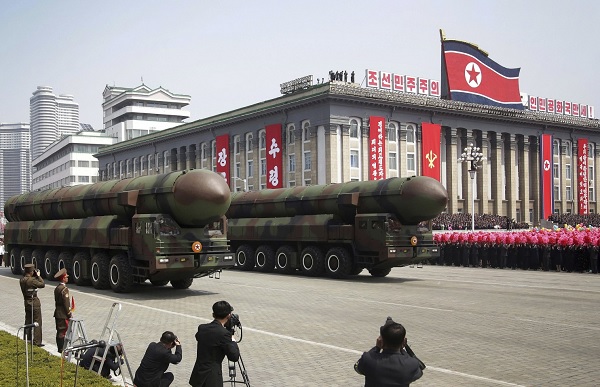Surely the American public and Congress, regardless of party, can agree that these costs are unbearable and unthinkable. Given the presence of many sober-minded strategists and policymakers in the administration, it seems reasonable to conclude the military taunts are a bluff. If so, they are a distraction from the real, pressing question: How much longer should they wait on economic pressure generated by Chinese sanctions, rather than pursue diplomatic options opened up by direct dialogue and engagement?
The Obama administration said it was open to dialogue, but put its money on sanctions and pressure as North Korea made the power transition from Kim Jong Il to Kim Jong Un. North Korea, unfortunately, is not vulnerable to the pinch of the purse like normal trading nations such as Iran. North Koreans are already so cut off from the global economy and disconnected from international society that deepening isolation does little to change their calculus.
The one promising thing about Kim Jong Un is that he harbors ambitions to improve North Korea’s economy, and his domestic policies have already generated modest growth. But his first priority is regime survival and national security, and for that, he considers the nuclear deterrent is to be essential (a rational proposition, sadly). Eight years of sanctions and pressure — but for one spasm of diplomacy just prior to Kim Jong Il’s death — did little to disabuse Pyongyang of the sense that it needs nuclear weapons, or to prevent North Korea from improving its capabilities and expanding its arsenal.
The Trump administration proclaims that the Obama approach of “strategic patience” has ended. But if it really wants to start a new era, the way to do so is not by distracting the public with reckless threats of war, while waiting in vain for Chinese President Xi Jinping to bring Kim to his knees. Instead, the prudent move would be to open direct talks with Pyongyang that start by negotiating a freeze on the fissile-material production cycle, return of International Atomic Energy Agency inspectors, and moratorium on testing nuclear devices and long-range ballistic missiles (including satellite launches). In return, the United States should at least entertain Pyongyang’s standing request for suspension of joint military exercises with South Korea. Kim may be willing to accept something less, such as an adjustment in scale. Or he may be open to a different kind of trade — initiating talks to convert the 1953 Armistice Agreement into a proper peace treaty to end the Korean War, for example. The only way to probe these options is to get to the table. With two months of large-scale exercises coming to a close, now is a good time to do so.
A freeze is just the initial move in what needs to be a long-term strategy that changes underlying dynamics and addresses what each side sees as the core of the problem. We cannot really know what Kim wants, and what he might give up to get it, until we initiate dialogue. But since he took power, there have been strong signals that his ambitions go beyond a nuclear deterrent, that his real goal is economic development. Rather than threaten war or deepen sanctions, a more productive path is to nudge Kim down the same road that the major countries in East Asia have all taken: a shift from power to wealth. If Kim wants to be North Korea’s developmental dictator, the United States’ best long-term strategy is to help him do so. We cannot rationally expect him to surrender his nuclear deterrent at the beginning of that process, but it is the only realistic path for getting him to do so eventually.
Now is the time to jump-start a diplomatic initiative that reopens channels, lowers tensions and caps North Korea’s capabilities where they are. Then, working closely with the new government in Seoul and others, the United States should support a long-term strategy that integrates North Korea into regional stability and prosperity. Because the nuclear program is the last budget item that Kim will cut, sanctions only deepen the misery of the North Korean population, and pressure fails to improve human rights abuses on the ground. The best way to alleviate the suffering of the North Korean people is to give them a chance to succeed economically and help open up their country step by step.
By simply inflicting economic pain, threatening military strikes and keeping tensions high, the United States is playing into the worst tendencies of the North Korean system. Kim’s nuclear intentions will harden and North Korea’s capabilities will only grow. It’s time to reverse course.
John Delury is an associate professor of Chinese studies at the Yonsei University Graduate School of International Studies in Seoul.
Photo Credit: Missiles are paraded across Kim Il Sung Square during a military parade in Pyongyang, North Korea, on April 15. (Wong Maye-E/Associated Press)









